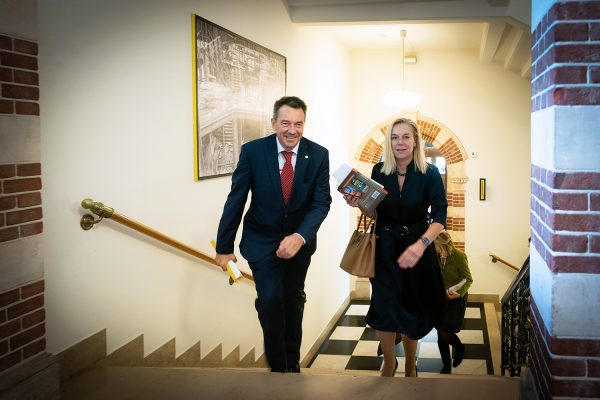
When the pro-European Sigrid Kaag became the Dutch finance minister in January, hopes were high that she would take a more relaxed view to debts and deficits in the EU.
AFP reported that Kaag was “tipped to smooth ties with debt-hit Southern European states that have previously been lectured by the Dutch to cut deficits.”
EUobserver knew it was “widely expected” Kaag would strike “a more dovish tone” than her Christian democratic predecessor, Wopke Hoekstra.
The Financial Times predicted that the “polyglot” Kaag — who led her left-liberal party D66 to a “surprise surge” in the polls despite receiving much “opprobrium” from the far right — would be “less hostile on topics such as revamping budgetary rules, joint EU borrowing and fiscal risk-sharing.”
Her presence around the Eurogroup table should help rebuild trust with southern capitals that often found themselves in Hoekstra’s line of fire.
It was wishful thinking.
Kaag’s priorities
In a speech in Maastricht, where the treaty that created the euro was signed thirty years ago, Kaag set out her priorities:
- Reducing debts.
- Raising growth through investment and structural reform.
- Creating an independent body to monitor eurozone countries’ compliance with fiscal rules.
Meet the new boss, same as the old boss.
Kaag did argue debt reduction must be gradual. The Netherlands is unlikely to insist on spending cuts to reduce debts that have been above the 60-percent-of-GDP treaty limit so soon after the corona crisis and while the economic effects of the war in Ukraine remains uncertain.
But she cautioned that investments (spending) must not get out of hand. European countries borrowed hundreds of billions of euros to soften the economic blow of COVID-19. The Netherlands alone did not tap into the EU’s €750 billion coronavirus rescue fund.
Taking enforcement of debt and deficit rules out of the hands of the European Commission is a new idea, but it reflects a long-standing Dutch frustration: that the commission has never enforced the Stability and Growth Pact.
Dead letter
An independent watchdog may be the price the Netherlands wants other countries to pay for relaxing debt and deficit rules.
The Stability and Growth Pact is a dead letter. Half the member states, including France, Italy, Germany and Spain, have debts above its 60-percent limit.
Not even the Netherlands has been able to keep its deficit under 3 percent every year.
Kaag said the repeated violations have “undermined the credibility of, and support for, the pact.”
Brussels bubble
The Dutch halfheartedly agreed to joint EU borrowing to finance the coronavirus recovery fund; Mark Rutte, the prime minister, took a lot of flak for resisting it.
Permanent EU-wide borrowing to reduce the cost of deficit spending in high-debt nations is still a bridge too far. The Dutch have been opposed to “eurobonds” since it was first proposed and still are.
How could so many media — The Economist and the Irish Independent made the same mistake — get it so wrong?
I suspect writers were taken in by Kaag’s cosmopolitanism. She studied in Cairo, Oxford and Paris, worked as a UN diplomat and married a foreigner. Brussels-based journalists saw her as one of their own and assumed she must share their views.
I don’t think support for low debts, low deficits, liberalization and sticking by the treaties you’ve made is so outrageous, but in the Brussels bubble that makes you a reactionary. Since Kaag isn’t, she must be for fiscal union.
Orthodoxies
Not all journalists got her wrong. Jeremy Cliffe had the better take in New Statesman. He understood that the Dutch Finance Ministry has “deeply-rooted orthodoxies that transcend the political hue of the minister in charge of it” and Kaag, while more open to fiscal integration than most politicians in the Netherlands, was unlikely to expend political capital on challenging those orthodoxies.
Other journalists need only have looked beyond Kaag’s immediate predecessor to know better. Jeroen Dijsselbloem, finance minister from 2012 to 2017, was more left-wing than Kaag, yet he also opposed eurobonds and looser debt and deficit rules. Dijsselbloem, who chaired the Eurogroup of eurozone finance ministers, went so far as to threaten Greece’s ejection from the single currency if it didn’t honor the terms of its bailout.
Kaag may yet subtly shift the Dutch position in the next three years, but anyone projecting a sea change is telling you what they want to see, not what we will.
